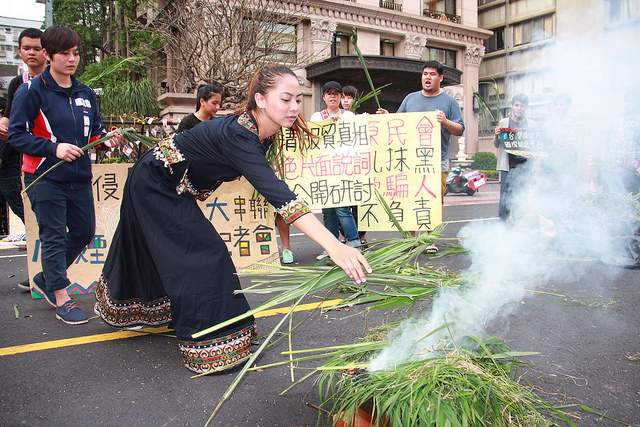Taiwan’s Indigenous oppose trade deal with China

The indigenous people used the smoke signal to warn their people and all of society against the trade agreement with China. (Photo: coolloud.org)
Those occupying Taiwan's legislature over the controversial Cross-Strait Service and Trade Agreement (CSSTA) between the island and China fear that allowing mainland capital to flow unrestricted into Taiwan will threaten Taiwanese culture, freedom of expression and national security.
The indigenous people of Taiwan worry in particular that the trade agreement will lead to the destruction of their ancestral land and the suppression of their languages, among other consequences, and members have participated in the protests.
A platform for discussing indigenous people-related issues, Pure-taiwan.info, explained how the agreement will affect the life of the indigenous people in Taiwan. One of the specific concerns involves the tourism sector. Given the exodus of young people from indigenous areas, leaving an aging population behind, the indigenous people will be forced to depend on tourism for their economy to survive.
But with the agreement opening the door to “China-style tourism”, mainland businesses will monopolize the sector for maximum profit, according to the site. Meanwhile, the indigenous will be left with the costs of conserving the environment and putting on displays of tradition and culture.
When Chinese corporations enter Taiwan in the tourist sector, they need the land to build hotels and other buildings for touristic services. […] This will bring serious threats to our ancestors’ land.
The dominance of Mandarin that the agreement represents is also worrying, according to the platform: Once the CSSTA is passed, Mandarin will be more dominant than it is today. Language is not only a tool for communication. Language is a symbol of the social-economic status and the culture hegemony. […] The domination of Mandarin and the dominant culture created by this language will threaten our identity built on our tradition and culture. In addition, this dominant power will also threaten our effort to maintain the legacy of the Austronesian languages in Taiwan.
Coolloud.org, an independent online media focusing on civil society news, also reported a statement from one of the protesting indigenous people about the change Chinese tourists have brought to the tourism industry in Taiwan: The current Magistrate of Hualien County, Fu Kung-Chi, has already started to prepare a budget for us to hold our ceremonies to serve tourists.
The Indigenous Peoples Action Coalition of Taiwan (IPACT) criticized that the Council of Indigenous Peoples and the legislators representing the indigenous people did not pay enough attention to the agreement's possible impact on the indigenous people’ rights: The Institute for Aboriginal Policy had expressed their concerns since last October when some indigenous people attended a public hearing. Although the Institute for Aboriginal Policy requested that the Council of Indigenous Peoples and the legislators representing the indigenous people to explain and communicate with the indigenous people, they did not give us any positive response yet. Moreover, they accused those who were concerned of spreading rumors or even breaking the law. The Council of Indigenous Peoples is an official institute to represent the indigenous people, so they should represent us and protect our rights and integrity when they make policies and related measures.
To evoke more discussion among indigenous peoples, several young Amis, the largest indigenous group in Taiwan, made a video introducing the CSSTA and explaining the protest to their friends and family.
Ayal Komod, an Amis musician and actor, also appealed to indigenous people for solidarity: The demand made by the students who occupied the Legislative Yuan is closely related to our future. [...] We need to strengthen our bond so that we can generate our power together. If we do not have enough power, how can we pursue a better future and provide for our people?
Source: Global Voices
Categories
Latest news
- LifeMosaic’s latest film now available in 8 languages
- การเผชิญหน้ากับการสูญพันธุ์ และการปกป้องวิถีชีวิต (Thai)
- LANÇAMENTO DO FILME BRASIL : Enfrentando a Extinção, Defendendo a Vida
- Enfrentando la Extinción, Defendiendo la Vida (Español)
- Peluncuran video baru dalam Bahasa Indonesia : Menghadapi Kepunahan, Mempertahankan Kehidupan


